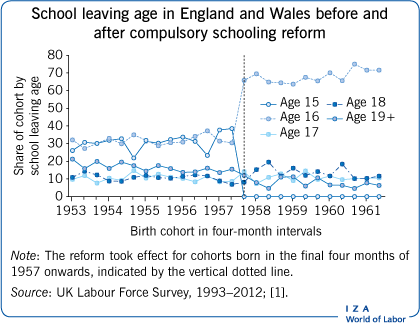Elevator pitch
Compulsory schooling laws are a common policy tool to achieve greater participation in education, particularly from marginalized groups. Raising the compulsory schooling requirement forces students to remain in school which, on balance, is good for them in terms of labor market outcomes such as earnings. But the usefulness of this approach rests with how the laws affect the distribution of years of schooling, and the wider benefits of the increase in schooling. There is also evidence that such a policy has an intergenerational impact, which can help address persistence in poverty across generations.
Key findings
Pros
Opportunity costs of remaining in school may decrease due to compulsory schooling reforms.
Changes in compulsory schooling provide an important tool to estimate the economic return to schooling.
Children of parents who had more schooling due to compulsory schooling reforms may themselves experience benefits.
Indirect benefits from compulsory schooling reforms include lower crime rates and improved mental health outcomes.
Cons
While politically convenient, compulsory schooling reforms are expensive.
Most evidence suggests that the education impact from compulsory schooling is primarily on the most “marginal” students.
Estimated returns are highest when compulsory schooling reforms encompass an important qualification level, which makes results hard to generalize.
There is less evidence of wider impacts from compulsory schooling on physical health or mortality rates.
